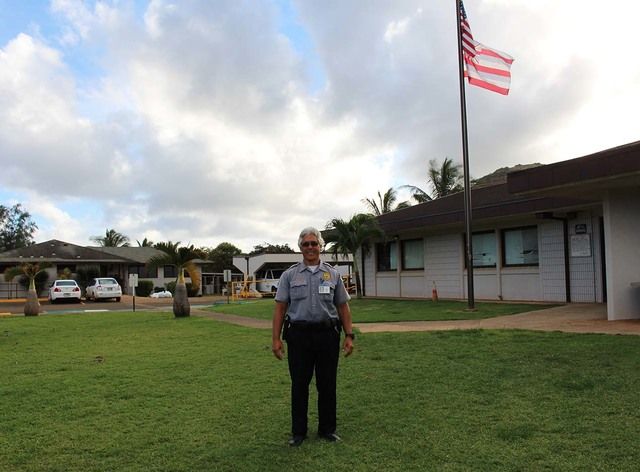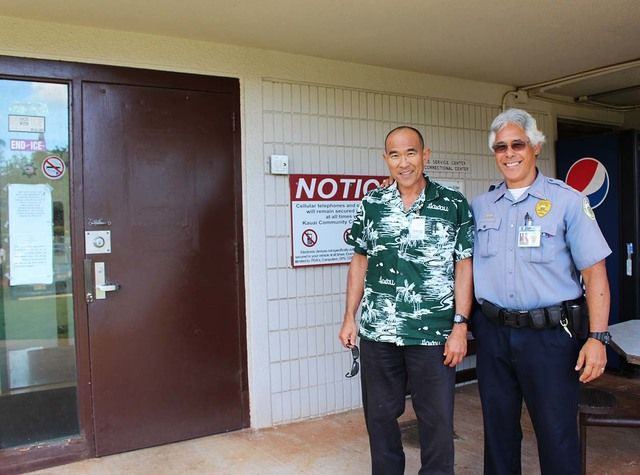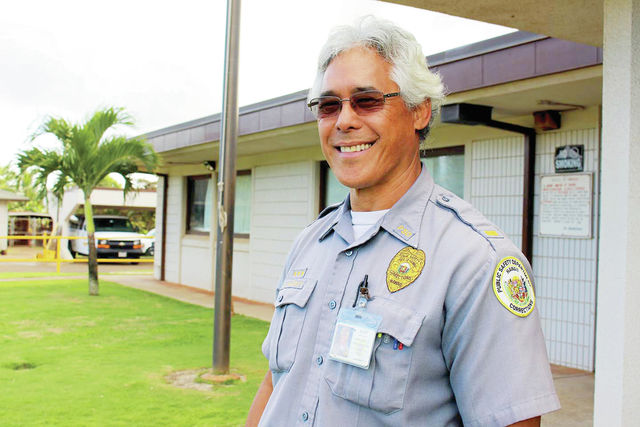LIHUE — Something is working over at Kauai Community Correctional Center. That’s what Lt. Thomas Weston Keolaikepapalua Lindsey Jr. will say if you ask him about the culture surrounding Kauai’s prison, its guards and the inmates who live there. “We’re
LIHUE — Something is working over at Kauai Community Correctional Center.
That’s what Lt. Thomas Weston Keolaikepapalua Lindsey Jr. will say if you ask him about the culture surrounding Kauai’s prison, its guards and the inmates who live there.
“We’re all one community,” Lindsey said. “It’s not us against them, bad guys. Crime comes in every shape, size and color. They come from good families, bad families, rich families, poor. If you were to ask me what a criminal looks like, I cannot describe him.”
Lindsey, who’s been working at the prison for 20 years, said as a corrections officer he has to carry a level of respect for those in their cells. Mutual respect is part of the job if you want to do well by the inmates, he said.
And that’s the kind of thing he wants those responding to the Hawaii Department of Public Safety’s recruitment call for new adult corrections officers to understand. The statewide recruitment period just opened and closes at midnight on Jan. 29.
Although there are no vacancies at KCCC, that can change as people retire or move on, said Toni Schwartz, spokeswoman for Hawaii Department of Public Safety. That’s why the department likes to keep a list of about 100 to 150 qualified applicants statewide, Schwartz said.
“When we have vacancies we pull people from the list throughout the year to go through training at our Basic Corrections Recruit Class,” Schwartz said. “BCRC is an eight-week training academy. Once they finish that they move on to their facilities.”
Recruits from throughout the state are flown to Honolulu to take part in the classes, she said.
Challenges and rewards come with the job, Lindsey said.
He said the time he has with the inmates is invaluable. Federal programs and community assistance is a sort of rehab for the inmates during their time in lockup. Contracts the state has with therapists and counselors help inmates and detainees deal with understanding issues like domestic violence and drug abuse, he said.
It’s a way for them to get help and to lower recidivism, Lindsey said.
“We have a small window of opportunity to effect positive change, but then they go out,” he said. “We need some sort of continuum, so they don’t lose the momentum. So they don’t revert to the places where they went.”
Lindsey, who’s been married since 1985 and has 14 kids, wasn’t always a corrections officer. He worked as an executive chef on Oahu and was close to an early retirement.
“We moved here and wanted to change our lifestyle,” he said. “There were no jobs.”
But then, everything kind of fell into place, he said. He had a cousin already working at KCCC, so he took a temporary job there, hoping every day he’d come home to tell his wife that he still had a job the next morning.
At first, he was just “here for the money.”
“With our mission statement and our profession, honorable calling, it took me a long time to get that,” he said.
But he did eventually find that “honorable calling,” he said.
“I found it dealing more with the warden and how he deals with inmates and he gets us to see how the second ‘C’ in KCCC is community,” Lindsey said. “So what he kind of instills in us is we have this time to make change in our conduct with the people that come here and that we’re going to run into them every day.”
Neal Wagatsuma, who has been KCCC warden since 1992, said what he does is more than a job.
“Whomever termed this profession a ‘calling’ knew something. Jails are not easy places to work in and logically, I cannot explain why I choose to do it,” Wagatsuma said in an email. “Whenever an inmate enters through our doors, they are usually at the lowest point in their life. A part of me always wonders how I can help the person make a change in their lives that lasts. Not too many people have this kind of opportunity in their lifetime. It might sound kind of weird to some people, but I love this work and it’s always been like that for me.”
It’s been 20 years and Lindsey, now 60, doesn’t regret taking the job as a corrections officer. But that doesn’t mean the job doesn’t come without its challenges.
The jail has been overcrowded for years. The jail’s operating bed capacity is 128, but this summer the in-house population peaked at 250. In December, the jail, which receives four to five additions a day, had a population of 184 inmates.
With that many inmates, you can expect complications, Lindsey said. Inmates will often have to share quarters because there is no other space for them.
“When you got eight guys in a room that’s meant to house four, or 10 guys in a room, I kind of liken it to this: If you got a five-passenger car, you can put two in the front and three in the back, tight. Try carrying seven,” Lindsey said. “And they don’t get along. You can’t move one. You have to move two, because of the dynamics. It’s a small island. Everybody knows everybody. Some of them have been victimized by the other one.”
The jail is looking to add a new prefabricated 40-bed segregation unit and hopes to receive $15 million should Gov. David Ige’s executive supplemental budget proposal be approved by the Legislature.
Lindsey said corrections officer occasionally will come across an inmate who is stirring up trouble and just not “being respectful.”
“You can escalate and challenge a guy or you can deescalate and stay calm,” he said. “There is always an opportunity to dialogue. We do have an opportunity to use force all the way to deadly force, but if we use our common sense and look at these guys and ask what is it that they really need and we spend the time talking to them, you can prevent the escalation. And they respect you for it.”
Noticeable about KCCC are its open, camp-like trailer cabins. There have been a number of inmates who try to escape, most unsuccessfully, Lindsey said.
“The inmates chased one guy and brought him back,” he said with a laugh.
The Department of Human Resources and Development, which handles hiring for the state, gets more than 1,000 applicants each recruitment period one to two times a year, Schwartz said.
Applicants must go through an extensive approval and qualification process that includes a physical agility test, an ergometrics test that measures their critical thinking skills and ability to problem solve, psychological evaluation and background check. Applicants must have completed high school or the equivalent and must be 21 or older.
If they pass all of that, then they are added to the approved list for consideration in upcoming corrections training classes throughout the year, Schwartz said.
Monthly salaries on Kauai for adult corrections officers start at $3,930.
As for Lindsey, he said he had his own troubles as a youth growing up in the 1970s and that it gives him insight into the minds of a lot of the inmates.
“Someone planted something in my head,” he said. “Several people, actually. An uncle here giving me a guitar. A teacher here, instead of calling the cops, letting me sleep off drug-induced thing in the back of his class. A cop bringing me home after I threatened to hit with my baseball bat. Those kind of things.”
“A smile can go a long way, too.”




